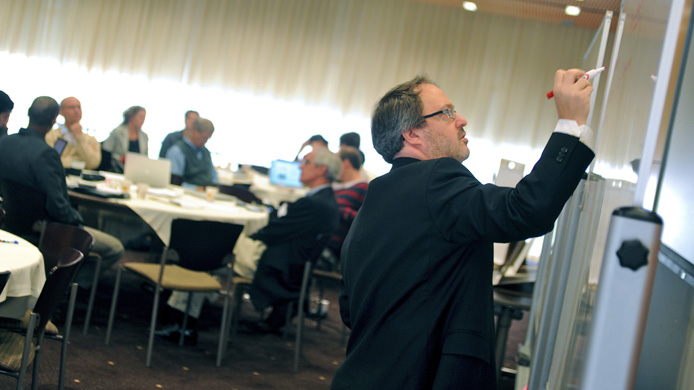You are here
Home › CNS-ASU Research ProgramsCNS-ASU Research Programs

CNS-ASU pursues its goals through two integrated types of research programs:
- Real-Time Technology Assessment (RTTA) engaging in fundamental, problem-oriented research on the implications of new technologies; and
- Thematic Research Clusters (TRC) have a more curiosity-driven agenda that generate broad societal themes.
Real-Time Technology Assessment (RTTA)
Real-Time Technology Assessment (RTTA) is a research approach that integrates the links between research innovation and society in mutually beneficial ways. By using RTTA, CNS-ASU is exploring the idea that nanotechnology innovation can be steered toward socially desirable goals by examining itself in real-time. In other words, if nanotechnology researchers are constantly assessing the outcomes of their work, they can make quicker decisions about how that work may be affecting society and can adjust their approach accordingly.
CNS-ASU conducts four different RTTA programs:
- RTTA 1: Research & Innovation Systems Analysis examines nanoscale research itself and its anticipated societal outcomes
- RTTA 2: Public Opinion and Values monitors changing opinions of the public and researchers regarding nanotechnology
- RTTA 3: Anticipation & Deliberation engages researchers and the public through interactive educational events
- RTTA 4: Integration & Reflexivity assesses the impact of research activities on the values and choices made by nanotechnology researchers
Thematic Research Clusters (TRC)
The Thematic Research Clusters (TRC) at CNS-ASU look at broad and cross-cutting themes in order to try and place nanotechnology in a broader social context.
CNS-ASU conducts two TRCs:
- TRC 1: Equity, Equality & Responsibility explores responsible innovation and the ways in which nano research interacts with social and economic equity.
- TRC 2: Urban Design, Materials & the Built Environment investigates visions of the future "nano city" through links between infrastructure, society and sustainability.


